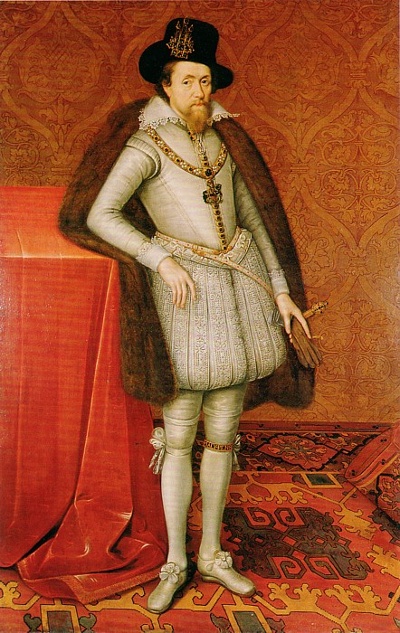King Lear Contents
- Social / political background
- Religious / philosophical background
- The Theatre
- Act I
- Act II
- Act III
- Act IV
- Act V
The Stuart Monarchy
Changes in the sixteenth century
Shakespeare was born just after the middle of the sixteenth century, a century which, in England, was fraught with extraordinary events. It was marked by discord, violence and change, particularly affecting the monarchy and the practice of the Christian religion in England. The tensions between worshippers who favoured a Catholic style of Christian worship, and those who followed the ideas of the Reformation, which brought in Protestant beliefs and practice, affected politics and society throughout the century.
More on the effect of Protestantism on Shakespeare: Under Elizabeth, compulsory church services were held in English rather than Latin, and a new Book of Common Prayer (i.e. prayers to be used uniformly throughout the Church of England) was introduced in 1559. Throughout his life, therefore, Shakespeare heard the words of the Bible in English and listened to the scholarly and poetical language of the Book of Common Prayer, both of which had a considerable influence on his own written style.
James I of England
Elizabeth reigned until 1603, when she was succeeded by her Protestant relative, James, King of Scotland, a member of the Stuart family.
 James as King of England
James as King of England
- Having been brought up as a Protestant, and as a strong opponent of his mother’s Catholicism, James faced opposition in England from the Catholic families who resented another Protestant ruler
- In 1605, the year in which King Lear appeared, a group of conspirators placed barrels of gunpowder under the House of Parliament, hoping to blow up the king and his senior ministers
- However, the plot (still known today as the Gunpowder Plot) was discovered and the conspirators arrested and executed. One of them, Guy Fawkes, gives his name to the ‘guy’ still burnt on bonfires in England on Guy Fawkes’ Night every year – November 5th.
More on Shakespeare and James I...: In the play he wrote the next year (1606), Macbeth, Shakespeare pays a compliment to King James, who traced his descent from Banquo, a noble opponent of Macbeth in the play. Shakespeare also introduces allusions to the Gunpowder Plot; for example, a medal was produced to commemorate the king’s escape, which had on it the image of a snake under a flower. In Macbeth, Lady Macbeth says to her husband: ‘Look like the innocent flower, but be the serpent under it.’
Name originally given to disciples of Jesus by outsiders and gradually adopted by the Early Church.
1. Sometimes used to denote all Christians
2. Used specifically of the Roman Catholic church.
1. Doing homage and giving honour and respect, especially to God. Acts of devotion. Human response to the perceived presence of the divine.
2. The part of the Christian liturgy usually consisting of sung material and prayers of thanksgiving.
Term given to the movements of church reform which in the sixteenth century resulted in new Protestant churches being created as an alternative to the Roman Catholic Church.
Christians whose faith and practice stems from the Reformation movement in the sixteenth century which resulted in new churches being created as an alternative to the Roman Catholic Church.
The book of prayers and church services first put together by Thomas Cranmer, Archbishop of Canterbury in the time of King Edward VI (1547-53) for common (ie. general) use in English churches.
Christians whose faith and practice stems from the Reformation movement in the sixteenth century which resulted in new churches being created as an alternative to the Roman Catholic Church.